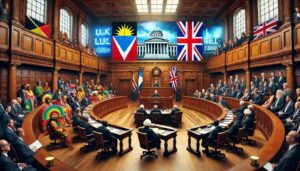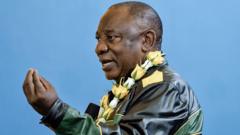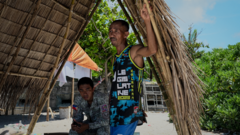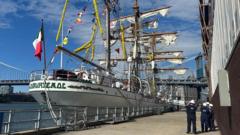This article examines Antigua's actions and the broader implications of their legal declaration in the international arena, including the responses from both the Antiguan government and the legal opposition they face.
**Antigua Announces Legal Offensive Against U.S. in Groundbreaking Lawfare Declaration**

**Antigua Announces Legal Offensive Against U.S. in Groundbreaking Lawfare Declaration**
In a striking move, Antigua & Barbuda's Sovereign Wealth Fund has initiated a legal battle against perceived U.S. injustices.
In a significant escalation of diplomatic relations, the Sovereign Wealth Fund of Antigua & Barbuda has publicly declared "Lawfare" against the United States, a move that signals potential new tensions in international legal practices. The declaration was made through legal counsel Rudy Delarenta, highlighting allegations of a concerted conspiracy involving asset seizures and political manipulation against Antiguan officials, particularly related to the controversial seizure of the Alpha Nero yacht.
The declaration emphasizes claims that U.S. entities, both governmental and private, have engaged in what Antigua deems "transnational racketeering" under the guise of lawful litigation. Among the accused are the State of California and various legal firms that Antigua alleges are part of a broader campaign to undermine its sovereignty.
Delarenta stated, “This is the beginning of a global reckoning," reflecting Antigua’s intent to position itself against what it perceives as a fundamental injustice perpetrated by larger powers. The declaration outlines a multifaceted legal strategy, including RICO lawsuits in the U.S. and private prosecutions in the UK and EU, asserting Antigua’s commitment to combat what it views as judicial overreach and international legal colonialism.
The backdrop of this declaration involves the sale of the Alpha Nero yacht, which the Antiguan government claims was lawfully seized and disposed of with appropriate authorizations from U.S. authorities. The government insists all proceeds from the sale were transparently allocated for public expenditures. However, the legal actions led by Yulia Guryeva-Motlokhov, the daughter of a sanctioned Russian oligarch, challenge this narrative. She claims the yacht's seizure was illegitimate, initiating her own litigation in U.S. courts.
In response, the Antiguan government has taken a proactive stance by employing U.S. legal counsel, not as formal defendants but to safeguard its reputation against allegations that it categorically denies. The government asserts its actions surrounding the yacht’s seizure were fully compliant with international standards and stresses that claims made by the opposition—and Guryeva-Motlokhov—are unsubstantiated.
The unfolding situation raises vital questions around international law and the weight of local legal decisions in the face of global political dynamics. It reflects a growing trend where nations are increasingly seeking to assert their rights and sovereignty in international legal arenas. As the world watches, Antigua's bold declaration not only challenges the status quo but ignites discussions surrounding the complexities of lawfare, sovereignty, and the intricate dance between powerful nations and smaller states seeking justice.
The declaration emphasizes claims that U.S. entities, both governmental and private, have engaged in what Antigua deems "transnational racketeering" under the guise of lawful litigation. Among the accused are the State of California and various legal firms that Antigua alleges are part of a broader campaign to undermine its sovereignty.
Delarenta stated, “This is the beginning of a global reckoning," reflecting Antigua’s intent to position itself against what it perceives as a fundamental injustice perpetrated by larger powers. The declaration outlines a multifaceted legal strategy, including RICO lawsuits in the U.S. and private prosecutions in the UK and EU, asserting Antigua’s commitment to combat what it views as judicial overreach and international legal colonialism.
The backdrop of this declaration involves the sale of the Alpha Nero yacht, which the Antiguan government claims was lawfully seized and disposed of with appropriate authorizations from U.S. authorities. The government insists all proceeds from the sale were transparently allocated for public expenditures. However, the legal actions led by Yulia Guryeva-Motlokhov, the daughter of a sanctioned Russian oligarch, challenge this narrative. She claims the yacht's seizure was illegitimate, initiating her own litigation in U.S. courts.
In response, the Antiguan government has taken a proactive stance by employing U.S. legal counsel, not as formal defendants but to safeguard its reputation against allegations that it categorically denies. The government asserts its actions surrounding the yacht’s seizure were fully compliant with international standards and stresses that claims made by the opposition—and Guryeva-Motlokhov—are unsubstantiated.
The unfolding situation raises vital questions around international law and the weight of local legal decisions in the face of global political dynamics. It reflects a growing trend where nations are increasingly seeking to assert their rights and sovereignty in international legal arenas. As the world watches, Antigua's bold declaration not only challenges the status quo but ignites discussions surrounding the complexities of lawfare, sovereignty, and the intricate dance between powerful nations and smaller states seeking justice.





















